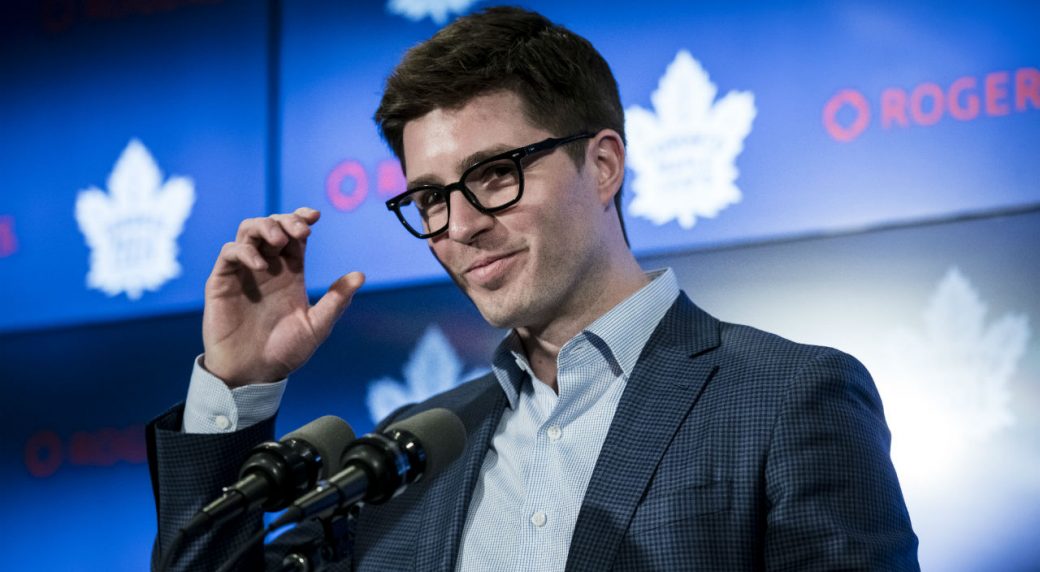Kyle Dubas joined TSN Overdrive on Thursday evening, discussing the decision to fire Mike Babcock, move forward with Sheldon Keefe, their shared vision for the team’s style of play, and whether blame for the 9-10-4 start partly falls on the players and GM.
The idea that maybe Mike Babcock wasn’t going to be the right guy for you and the team you were trying to build and the team you were hoping to see play on the ice — take us through that. Why did you bring Babcock back for these 23 games?
Dubas: I think at the end of the season, it would’ve been the same with Sheldon in the years I worked with him and in the years I worked with Mike, you look back at the season and you evaluate the season and the changes that you want tt make. I totally understand the question. I think if people are befuddled by the fact that could’ve done it and then tried to go through 23 games and then do it… I understand it doesn’t put the team or Sheldon into a great spot, but I think the reality is that I really wanted it to work with Mike and to go through a summer and try to find a way to push our team to the next level. At the same time, just because we had done that, it didn’t mean that when we sensed things weren’t going to go the way we wanted, that it would’ve been right just to keep rolling along as we were. Thus, we felt the need to make a change.
In terms of deciding this is it — was it more about the systems and style of play and the tactical errors Babcock was making, or was it the way the team was receiving it? Sheldon Keefe said multiple times today that he has got to lift up the spirits of the team. Was it the Xs and Os or more about the passion and the disposition of the team?
Dubas: I was just observing the team in terms of how we were playing and it wasn’t necessarily going well by any measure — wins or anything underlying. It wasn’t necessarily going the way we envisioned. With that, especially when a coach has been in a place for a long time — for better or worse, in coaching and in management, five seasons is a well-above-average stint — you start to worry about where things are going and where they are heading, and whether someone who has been there for that long can move to get things going in a different, better direction.
I don’t think it is one specific thing. It is a combination of all of the things that you had mentioned with the underlying part of us wanting to do what is best for our club and the feeling that Sheldon is the best person to do that for us.
When you went in and addressed the team, was there a sense where, for lack of a better word, you had to read them the riot act a little bit and say, “As much as I’ve had to make this change, a lot of this is on you.” How did that transaction go down? How did you address the players?
Dubas: We haven’t played to the standard we are capable of. We have shown that standard in stretches and in games and in parts of games throughout the year, even going back to last year. We haven’t been able to find it on a consistent basis. Not reaching that standard is a condemnation of the players but it is also reflective of everybody in the organization. I am unhappy with the players and that we haven’t been able to find that level of consistency, and I told them that. I also explained to them where the blame is certainly on myself and the coaching staff.
I think when we are looking at why things haven’t gone the way they should have gone, I know there has been a lot even internally here where we are trying to figure out whose fault was it. Mike paid the price, but the reality is, when these types of things happen, usually every part of the organization has not performed to the standard expected. That was what was communicated to the players and we certainly focused on the way they have played.
Where do you factor in that? Are you talking about the players you’ve acquired, how you’ve built the team? In which way do you take some responsibility in a 9-10-4 start?
Dubas: In professional sports, when things don’t go up to the standard you expect, it all goes onto management. It all goes onto me. That is what I signed up for. I think that is what we all signed up for when we do this job. You are trying to acquire the players that fit the system. You’re trying to make sure that you’re on the same page as the coaches and you’re bringing that onside. When it happens, you are always trying to improve the team and acquire players and sign free agents and make sure the draft choices fit the model and get the team moving ahead. That hasn’t happened.
I know a lot of people dance around it, but I don’t think there is any reason to dance around it that I put that all on myself. I don’t try to look anywhere else. I know that may come off as a disingenuous thing to say the day after you relieved the head coach of the duties and replaced him, but that is all part of me trying to do my part for the organization and the job they’ve put in me to do — to try to get our group collectively to the spot that we want. I put that on myself.
I know our players accept their portion of it as well. Regardless of what they say or how it comes across, they’ve expressed that personally and privately. I think we are all disappointed in ourselves and we all have to get to work to get us to the level I think we all expect and think we are capable of.
How sophisticated is the message to the new coach? There are different things you want to change, but you can’t really say, “fix this and fix that” going into a new game tonight. Is it just simplify things and say these are some really simple things we want to fix? How complex is the message you send to him going into this new era with Sheldon Keefe?
Dubas: That was a tougher one for sure. We are in the middle of a road trip. Sheldon didn’t really have a practice. Sheldon flew in last night after everything kind of happened, and then he had a pre-game skate, which as we all know are not the most robust entities anymore. The players are just trying to get out there — even if there is one — and get their legs under them and get a sweat going and get off at most, if they even go out for them. Today, we had some very minor systems things that Sheldon wanted to work on. He had a meeting with the team and a very brief pre-game skate — which I don’t remember the last time I’ve seen some actual systems work and building of systems work in one.
It is certainly going to be a little bit unconventional. It is going to be challenging. My messaging to Sheldon, having gone through this with one once before with an in-season change where he came in, is just to continue to be himself and everything that he has been about as a coach and begin to build it out. I think everyone here knows it is not optimal for him, but I think he will be able to find his way through with time and begin to build his relationships with players and begin to install the different changes he wants to make in terms of how we play.
I don’t think it will be perfect right out of the gate; I think it will require some time. As I challenged the players yesterday, my expectation to them is that we need them to double down on their concentration, their focus, and their commitment to the cause here if we are going to get this righted and moved in the right direction. There are going to be some things that are a little bit unorthodox that we have to do because of the timing of the move, but I’ve got full belief that Sheldon will get buy-in from the players and the players are bought into getting this turned around.
There is that old speech once in a while where someone comes in and says, “We’ve got to go out there and have some fun.” It just seems far away from that. You must want to come close to that, but there is so much stress involved, too, that it’s a difficult convo to have.
Dubas: Maybe I focused too much in my answer on the systematic changes and the different things to be done. In talking to Sheldon in the last day and this morning, and I know in his discussion with the players, I know there was a certain part of that — that feeling free, feeling creative, and really just enjoying themselves out there again. I think he alluded to it with the spirit of the team and focusing on what it is that we do well and have in abundance and really maximizing that. I think those two go hand in hand. I didn’t mean to paint too dreary of a picture with all the boring systems and tactical work we have to do.
Were there any other coaches in consideration?
Dubas: None at all. Just Sheldon.
You’re bucking a lot of conventional trends here. You are handing the keys over to a rookie coach. 50% of your cap is tied up in 40% players. Not a lot of size. Not a lot of physicality. Conventional wisdom in the sport with grit, hitting, fighting, all of that stuff — that’s not really what you’ve built here. There is a lot of skepticism in the hockey world. Take us through why you believe this plan and this philosophy will work.
Dubas: My belief in the philosophy that we have and the way we are sort of designed to play — I think that by building a team that is intelligent and fast and creative and highly skilled, the vision is that we will want to have the puck as much as possible and we will keep the puck every possible time we can have it. Although it may not seem like the brute toughness that some may prefer, the way I look at it is that you can go into something and you can try to outpower somebody or you can technically try to wear them down and break their will a little bit that way.
I think by having the puck all the time — and the minute that we don’t have it, quickly getting tenacious to get it back and not letting teams get past their own blue line, past the red line, and then into our own zone, constantly putting pressure on them with our speed and our intelligence and our skill level — we’ll exert ourselves in a different way and be able to impose our will on teams a different way. I know that a lot of people will scoff at that and I think it is well within their rights to have doubt and have skepticism. It is up to us to continue, as people have doubts, to continue marching along with the Leafs and what we are doing here.
In the end, and I think rightfully so, the fans and the media will be able to judge whether we were right or wrong. If we hide from it and we never put ourselves out there and we change on the fly to acquiesce to what convention or what people want, we will never find out whether we can be truly successful or not. I have full belief that we will be. I am willing to bet my job and my career on it. Time will be the judge on whether we are right or wrong, and we will just keep doing our thing and try to ignore the noise as best we can and continue to march along in the face of doubt and skepticism. In a few years, we’ll know.
Does Sheldon have full autonomy as far as the way he wants to deploy the players, or is there going to be some input from above and the sides?
Dubas: He and I argue more than anybody I have ever worked with before. We talk about this stuff. It has been interesting the past year and a half where he’s been in the organization and Laurence Gilman has been handling that side with the Marlies. Though we talk, it hasn’t been the same daily back-and-forth about players and tactics and anything like that. I welcome his insights and inputs on players we are looking to acquire and even draft. He is open to my take on what is happening on the ice. Ultimately, he is the one behind the bench and I defer to him. I think the same thing goes for our player acquisition and our development and our drafting model.
I would say, in my mind, I have 100% full trust in him and the fact that he is going to execute tactically the way that the team is designed to get the most out of the team. If we need to make adjustments, he and I have always been able to have a good discussion on it. I think the way to put it is that in the time we worked together in the Soo and the Marlies, we have always worked closely together and some of the biggest disagreements we’ve had have let to our teams taking good steps. I look forward to our first major disagreement here which will probably be in a few days, and we’ll roll on.

































